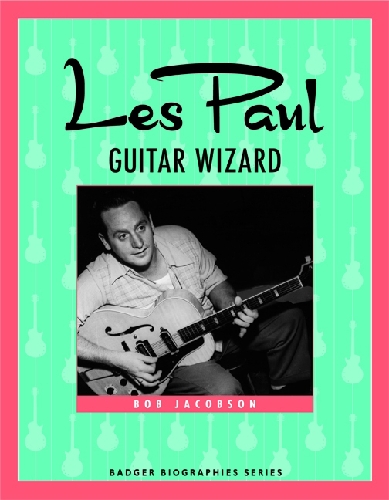Don’t fret. ‘Les Paul: Guitar Wizard’ will be a big hit

For as long as you can remember, you’ve had a big dream.
It started with a musical toy and ended with the iPod you carry everywhere. At some point in between, you sang along with your parents’ music (which you loved), found your own songs, and now you want to perform onstage someday just like your favorite music stars.
Nobody does air-guitar like you, in fact, but imagine a world without the zing of the string. As you’ll see in the new book “Les Paul: Guitar Wizard” by Bob Jacobson, if it wasn’t for one boy’s curiosity, electric guitars might never have been invented.
Almost from the time he was able to walk, young Lester Polsfuss was a curious kid. He was also very close to his mother, who indulged him by playing her beloved German songs for him, and by allowing him to take things apart. By the time he was 10 years old, little Les would easily destroy things (like radios and pianos) and then put them back together again, just so he could see how they worked. This fed his two greatest interests: music and electronics.
When he was 11 years old, Les got his first guitar. It cost less than five dollars, and he quickly taught himself to play it. He then devised a wire hanger to hold his harmonica so he could play both, and he started performing under the name of “Red Hot Red” (because of his red hair). At age 13, he had his first paid gig.
But his hometown of Waukesha, Wis., couldn’t hold Les’s dreams and neither could his cheap guitar. He began experimenting with electricity to make a guitar sound bolder. At that time, guitars were quiet instruments, the sounds of which were often drowned out by drums and trumpets.
By age 15, all his guitar practice paid off. Les got an offer to play with a band in another state, and his mother gave him permission to go. From there, he changed his name to Les Paul, started his own band, and eventually moved to New York, Chicago then California. He also continued to try to mix electricity with a guitar.
He was sure it could be done. Like every other challenge he’d ever had, he just had to figure it out.
Got a little music fan in the house or maybe a future rock star? Then you’ll want to give him this book, no strings attached.
Jacobson gives kids a clear idea of the unique and unusual childhood that Les Paul enjoyed, which allowed him to grow up to do what he did. Jacobson also offers a good sense of what it was like to be a musician in the mid-twentieth century which, considering today’s bodyguards and mega-security, may surprise young readers.
Though this book is meant for older grade-school children, I think it would also please a grown-up guitar aficionado. If you’re looking for a book for either one, then, don’t fret. “Les Paul: Guitar Wizard” will be a big hit.
View publishes Terri Schlichenmeyer’s children’s book reviews weekly.